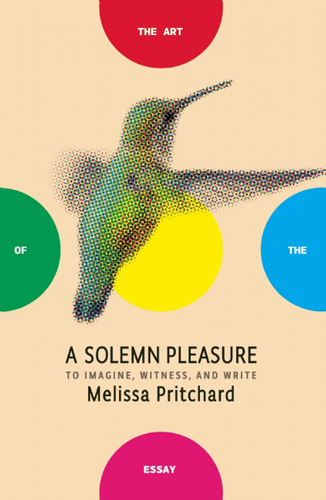A Solemn Pleasure
A Solemn Pleasure: To Imagine, Witness, and Write opens with “A Room in London,” a rumination on the physical space Melissa Pritchard occupied while temporarily living and writing in a borrowed London flat. This particularly brief piece (four pages) introduces the collection by touching on topics more thoroughly explored later in the book: Pritchard describes herself at work, presents her belief in writing as a spiritual—often religious—act, and embraces the essay’s ability to successfully grow around an ill-defined plot. A Solemn Pleasure: To Imagine, Witness, and Write opens with “A Room in London,” a rumination on the physical space Melissa Pritchard occupied while temporarily living and writing in a borrowed London flat. This particularly brief piece (four pages) introduces the collection by touching on topics more thoroughly explored later in the book: Pritchard describes herself at work, presents her belief in writing as a spiritual—often religious—act, and embraces the essay’s ability to successfully grow around an ill-defined plot.
At times concerned with philosophical or theological musings, at other times firmly rooted in the world of narrative journalism, this fifteen-essay collection demonstrates Pritchard’s willingness to dive into a variety of nonfiction modes.
Immediately following the opening short is the essay “Spirit and Vision,” a whimsical bit of writing in which Pritchard tackles the question “why write?” She makes some bold statements: “Great writers are witnesses to the spirit of their age. [ . . . ] Speaking the truth, they may go unheard, be misunderstood or criticized.” Readers who roll their eyes at this self-serving description of writers will need to have patience with Pritchard. The statements stand largely unqualified, which has the effect of either emboldening or irritating readers.
Surprisingly, Pritchard’s willingness to boldly state belief as fact grows into one of the collection’s most exciting features. Later in “Spirit and Vision,” she promotes the notion of “literature as a sacred vocation.” She writes:
Many of the tenets of sainthood are also to be cultivated in the committed writer: selflessness, the death of the little self, purity of spirit leading to intensity of vision. [ . . . ] Consider for a moment your work as analogous to intimate prayer in which you address God, and thereby divineness, in all matter.
Now I’m simply shouting my approval. This belief-as-fact approach can be infuriating, but more often it’s exciting to see a writer simply state—in clear, well-rendered prose—what she believes is her responsibility as a writer.
“Finding Ashton” is a profile of an American soldier in Afghanistan. With it, Pritchard has constructed a deeply moving portrait. “Still, God Helps You” is an impressive example of narrative journalism. Pritchard befriends a man who had been a child slave in Sudan. Their interviews serve as the essay’s heart. Pritchard puts herself on the page but never gets in the way of his story, deftly inserting herself at the most opportune moments and pulling away so the emotional thrust builds on his words instead of her own narration.
The most direct craft essays in A Solemn Pleasure are its weakest selections. In “Elephant in the Dark” Pritchard extols the importance of choosing the proper point of view in fiction. I found the essay useful—it will be a great teaching tool—but it’s doubtful a general readership will find the piece compelling. In “On Kaspar Hauser” she describes herself working on a magazine article. This essay appears to assume the reader’s prior exposure to, and enthusiasm for, the article she was working on. The writing here is clear and basically pleasurable, but it doesn’t have the same punch as the collection’s stronger pieces.
In the title essay, Pritchard deals with the death of her mother. The structure is slightly unconventional—utilizing found forms and texts—and Pritchard makes statements that demonstrate her belief in the mystic. There are ghosts. A lamp flies across a room, of which she writes, “We all saw it.” I find that, in the least, difficult to believe. But Pritchard’s strong sentences still move me along. The day before her mother dies, Pritchard delivers flowers to her bedside. She writes, “One month later, a clairvoyant came up to me and said, I see your mother has tiny little birds flying all around her—hummingbirds!—also, she says to thank you for the lilies you gave her, they have always been her favorites.” Pritchard tells this as pure fact, as if clairvoyance is something everyone should believe in. I don’t, and still it is exciting to experience the world through the writing of someone who does.
I was sitting on the back porch when I first read the title essay. Blossoms were in early bloom on a nearby cherry tree. Pritchard’s assertion of the mystic, that invisible birds visited her dead mother, was trying my patience. Of course, if they had, it would be a lie of omission to leave the detail out. Still, it seemed an unlikely and convenient detail. As I sat on the porch in frustration at Pritchard’s ghost birds, an unlikely and inconvenient—at least for a cynical book reviewer—thing happened. A bright red cardinal landed on the branch nearest me. I had never seen one before. It was only a few feet away. I couldn’t believe how brilliantly crimson it was. The feathers on its head shimmered in the sunlight. It sat there for minutes, as if making a point. This actually happened. I couldn’t believe it.
A Solemn Pleasure is full of lovely sentences that often achieve an almost mystical, spiritual power. Perhaps readers won’t share Pritchard’s spiritual beliefs, but they should believe in her sentences. She’s a powerful writer.





